Either directly or indirectly. Legal Notice This book is copyright protected. This book is only for personal use. You cannot amend, distribute, sell, use, quote or paraphrase any part, or the content within this book, without the consent of the author or publisher. Disclaimer Notice Please note the information contained within this document is for educational and entertainment purposes only. All effort has been executed to present accurate, up to date, and reliable, complete information.
No warranties of any kind are declared or implied. Readers acknowledge that the author is not engaging in the rendering of legal, financial, medical or professional advice. The content within this book has been derived from various sources. Please consult a licensed professional before attempting any techniques outlined in this book. By reading this document, the reader agrees that under no circumstances is the author responsible for any losses, direct or indirect, which are incurred as a result of the use of information contained within this document, including, but not limited to, errors, omissions, or inaccuracies. Table of Contents
Introduction
F ood cravings, or the burning desire to eat a particular food, seem to be very common.
A survey indicates that, depending on the population studied, the people who reported being taken from food cravings vary between 60 - 90%. Interestingly, men and women attribute to these cravings conflicting behaviors and emotions. Normally men think that food cravings arise from hunger, while it is easier for women to attribute them to negative moods such as boredom and stress. Women are also more likely to experience negative feelings, such as guilt and remorse, if they have succumbed to temptation. At one time going out to dinner with friends was a pleasure. The restaurant was chosen in anticipation of the idea of tasting the specialties praised by the gastronomic guides, and delicious evenings were spent evaluating the dishes with the others, chatting and laughing, and in the end we returned home happier.
You can no longer: who is vegan, who is lactose intolerant, who is allergic to pine nuts, or to pork, rabbit, and strawberries. There is what the moon diet does, the other that of the Paleozoic, or that of asparagus for breakfast, lunch and dinner. Who the Atkins, who the Dukan, who that of the blood group, and then often you find the one obsessed with healthy food, who does not eat if not the things prepared at home, washed hundreds of times and bought only in a shop of his absolute trust. And then there are those who do not eat fish, those who do not eat meat, those who eat only raw food, but the worst is the one who exhausts you by pontificating that what you eat is pure poison, and only what he eats could make you live healthy, up to a hundred years, and he believes it with absolute certainty of a religious person: only he has seen the light, and you, unfortunate, who still put sugar in coffee and even drink it again, you are destined to die quickly. In short, it is now almost impossible to be happy eating, at least in company. We are so obsessed with food that we talk about it all the time, venerating or demonizing it, but we have lost its primary and essential meaning.
Food is the basis of life, without nourishment we would die, and it is true that without respect for what we ingest we could get sick, but we get sick not only for the insane, but also for the too healthy. Obsessiveness hurts in every field, like integralism, which does not respect the culture and culinary choices of others. We often forget that before the advent of intensive agriculture and new cultivation methods we were suffering from famines, we ate little, rickets and scrofulous were widespread in the poorest sections of the population, life expectancy was much lower, and on average, people died much younger than now. At our times, there is much more food available and we ingest more calories than before, our bodies develop much more robust bone structures and withstand diseases much better, not only because of the sacrosanct scientific progress, but also because we are more nourished, and therefore stronger. And we forget we are basically omnivorous, and this feature has allowed us to evolve, allowing us to adapt even to extreme situations: we have always managed to find something to put under our teeth to survive, even during the worst wars and the most epochal famines. Being omnivorous also helped us to develop very important brain skills, such as observation skills, curiosity and memory: eating only bamboo shoots, such as pandas, we would not have gone anywhere, said with all the love possible for Panda.
So to stay healthy and awake we need the greatest possible variety of foods, if we do not even perceive the goodness and variety of food that nature offers us, and above all we deprive ourselves of a fundamental primary pleasure, which is to feel joy in feeding us. Instead, eating is now a struggle against everything and everyone, and it is this situation of omnipresent tension that hurts us a lot, not a teaspoon of sugar. Our relationship with food must be completely revised, the land and what it offers us must be respected, choosing healthy foods, possibly grown in areas close to where we live, buying meat from animals bred outdoors and treated properly, fish that has swum in the sea, hens' eggs that have scratched on the ground and not forced into the horrid cages. But above all, we must rediscover the pleasure of sharing food with others, while respecting those who eat differently from us. After all, greatest transgression today is eating everything, if we want to do it, with tranquility and serenity, realizing how lucky we are to live in an era of food abundance. Of course, this is also what made us lose the sense of food and its strength.
Aristotle claimed that the more hungry we are, the more good we eat. So let's try to eat a little less, and when we find ourselves around a table we abandon ourselves to the pleasure of the banquet without demonizing those who eat a steak, or the seitan, or just a carrot, without trying to make proselytes for one o the other food faction. Mutual respect, hospitality, are the basis of civilization, and are good not only for the table, but also for all the rest.
CHAPTER 1:
Mediterranean Breakfast Recipes
Eggs with Zucchini Noodles

Preparation time: 10 minutes Cooking time: 11 minutes Servings: 2 Ingredients: 2 tablespoons extra-virgin olive oil 3 zucchinis, cut with a spiralizer 4 eggs Salt and black pepper to the taste A pinch of red pepper flakes Cooking spray 1 tablespoon basil, chopped Directions: In a bowl, combine the zucchini noodles with salt, pepper and the olive oil and toss well. Grease a baking sheet with cooking spray and divide the zucchini noodles into 4 nests on it. Crack an egg on top of each nest, sprinkle salt, pepper and the pepper flakes on top and bake at 350 degrees F for 11 minutes.
Divide the mix between plates, sprinkle the basil on top and serve. Nutrition: Calories 296, Fat 23.6, Fiber 3.3, Carbs 10.6, Protein 14.7



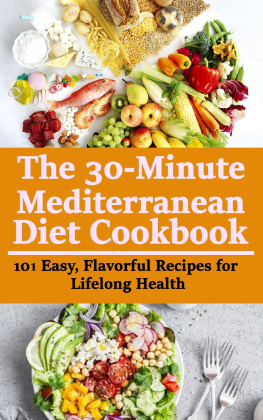
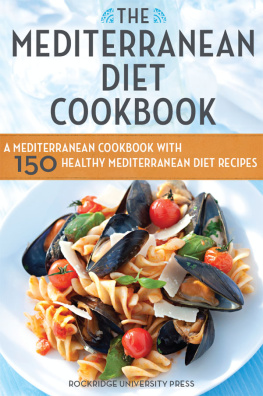
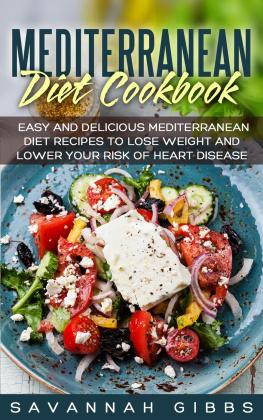
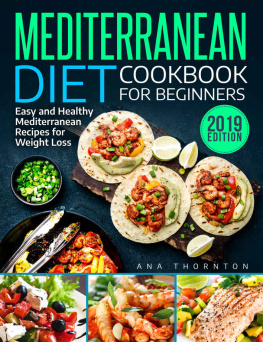
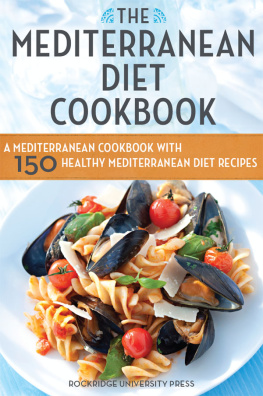
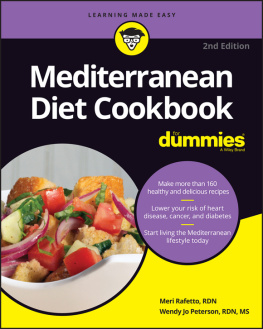
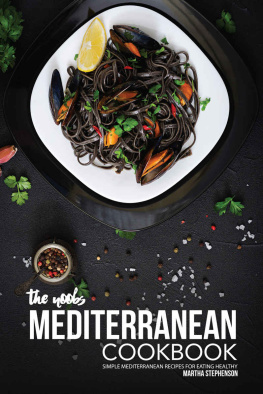
 Preparation time: 10 minutes Cooking time: 11 minutes Servings: 2 Ingredients: 2 tablespoons extra-virgin olive oil 3 zucchinis, cut with a spiralizer 4 eggs Salt and black pepper to the taste A pinch of red pepper flakes Cooking spray 1 tablespoon basil, chopped Directions: In a bowl, combine the zucchini noodles with salt, pepper and the olive oil and toss well. Grease a baking sheet with cooking spray and divide the zucchini noodles into 4 nests on it. Crack an egg on top of each nest, sprinkle salt, pepper and the pepper flakes on top and bake at 350 degrees F for 11 minutes.
Preparation time: 10 minutes Cooking time: 11 minutes Servings: 2 Ingredients: 2 tablespoons extra-virgin olive oil 3 zucchinis, cut with a spiralizer 4 eggs Salt and black pepper to the taste A pinch of red pepper flakes Cooking spray 1 tablespoon basil, chopped Directions: In a bowl, combine the zucchini noodles with salt, pepper and the olive oil and toss well. Grease a baking sheet with cooking spray and divide the zucchini noodles into 4 nests on it. Crack an egg on top of each nest, sprinkle salt, pepper and the pepper flakes on top and bake at 350 degrees F for 11 minutes.